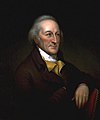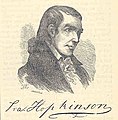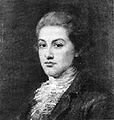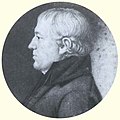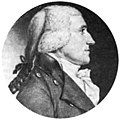Founding Fathers of the United States
As Founding Fathers of the United States ( English Founding Fathers ), the men referred to the resolution adopted July 4, 1776 Declaration of Independence or the Constitution of the United States , signed or otherwise as leader of the patriots of the American Revolution took part. The founding fathers are credited with remarkable intellectual abilities and foresight.
The delegates of the Constitutional Congress
The 55 delegates who attended the Philadelphia Convention formed a cross-section of the ruling elite of colonial America in the 18th century. Almost all of them were well educated men with views consistent with those of the majority in their communities and states, and many were known on a national scale. Virtually all of them had participated in the American independence movement; at least 29 had served in the Continental Army, many in commanding positions.
Political experiences
The group as a whole had extensive political experience. At the time of the Congress, four fifths of them (41 people in total) were current or former members of the Continental Congress . Mifflin and Gorham had worked as president. The only ones with no experience in the Continental Congress were Bassett, Blair, Brearley, Broom, Davie, Jonathan Dayton , Alexander Martin , Luther Martin , George Mason , McClurg, Paterson, Charles Cotesworth Pinckney , Strong, and Yates. Eight men ( Clymer , Franklin , Gerry , Morris , Read , Sherman , Wilson and Wythe ) had signed the Declaration of Independence. But only two - Sherman and Robert Morris - signed all three of the nation's founding documents. Virtually all of the 55 delegates had experience from colonial and state governments. Dickinson, Franklin, Langdon, Livingston, Alexander Martin, Randolph, Read, and Rutledge had been governors and the majority had worked in county and local governments.
jobs
The delegates held a wide variety of professions, and many pursued more than one career at the same time. 35 were lawyers or had received legal training, although not all pursued this profession to earn a living. Some had also become judges.
At the time of Congress, 13 of them were businessmen, traders, ship dealers, or shippers: Blount, Broom, Clymer, Dayton, Fitzsimons, Gerry, Gilman, Gorham, Langdon, Robert Morris, Pierce, Sherman, and Wilson. Six were land speculators on a grand scale: Blount, Dayton, Fitzsimons, Gorham, Robert Morris, and Wilson. Eleven speculated on a large scale in collateral: Bedford, Blair, Clymer, Dayton, Fitzsimons, Franklin, King, Langdon, Robert Morris, Charles Cotesworth Pinckney and Sherman. Twelve owned or managed slave plantations or large farms: Bassett, Blair, Blount, Butler, Carroll, Jenifer, Mason, Charles Pinckney, Charles Cotesworth Pinckney, Rutledge, Spaight, and Washington. Madison owned slaves . Broom and Few were little farmers.
Nine of the men received a substantial portion of their income from public office: Baldwin, Blair, Brearley, Gilman, Jenifer, Livingston, Madison, and Rutledge. Three had retired from active business: Franklin, McHenry, and Mifflin. Franklin and Williamson were scientists among their other occupations. McClurg, McHenry, and Williamson were doctors, and Johnson was the university president. Baldwin had been a minister, and Williamson, Madison, Ellsworth, and perhaps others had studied theology but had never been ordained.
Some of the delegates were rich. Washington and Robert Morris were among the wealthiest men in the nation. Carroll, Houston, Jenifer, and Mifflin were also extremely wealthy. Most of the others had financial resources that ranged from good to excellent. Among those with the most limited options were Baldwin, Brearley, Broom, Few, Madison, Paterson, and Sherman; nevertheless they were doing very well.

Significant numbers of the men had been born into leading families: Blair, Butler, Carroll, Houston, Ingersoll, Jenifer, Johnson, Livingston, Mifflin, Governor Morris, both Pinckneys, Randolph, Rutledge, Washington, and Wythe. Others had come up from humble backgrounds by their own strength: Few, Franklin, Gorham, Hamilton, and Sherman.
Geographical and educational background
Most of the delegates were born in the thirteen colonies . Only eight were born elsewhere: four (Butler, Fitzsimons, McHenry and Paterson) in Ireland , two (Davie and Robert Morris) in England , one (Wilson) in Scotland and one (Hamilton) in the West Indies . Reflecting the mobility that had always characterized American life, many of them had moved from state to state. 16 had lived or worked in more than one state or colony: Baldwin, Bassett, Bedford, Dickinson, Few, Franklin, Ingersoll, Livingston, Alexander Martin, Luther Martin, Mercer, Governor Morris, Robert Morris, Read, Sherman, and Williamson . Various others had studied or traveled abroad.

The educational background of the founding fathers was very different. Some, like Franklin, were largely self-taught and had received little basic training. Others had been taught by private tutors or in private academies. More than half had studied or graduated in colonies in British North America or abroad. Some men had received advanced or honorary degrees. For the most part, the delegates were excellently trained.
Longevity and family life
For their time, the delegates to Congress (as well as the signatories of the Declaration of Independence) grew remarkably old. Their median age at death was nearly 67. Johnson was 92, John Adams was 90, and Few, Franklin, Madison, Williamson, and Wythe were over 80. 15 or 16 (depending on Fitzsimmons exact age) became over 70 and 20 or 21 died over 60. Eight were over 50; five over 40 and two (Hamilton and Spaight) were killed in duels. Houston was the first to die in 1788; last in 1836 Madison.

Most of the delegates married and had children. Sherman fathered most of the children: 15 out of two wives. At least nine (Bassett, Brearley, Johnson, Mason, Paterson, Charles Cotesworth, Pinckney, Sherman, Wilson, and Wythe) married more than once. Four (Baldwin, Gilman, Jenifer, and Alexander Martin) were bachelors for life. In matters of religion, the men reflected the overwhelming character of American religious life of the time and were of various denominations. Only two, Carroll and Fitzsimons, were Roman Catholics. Some did not belong to any particular religion. Some were declared opponents of organized religions.
Careers After Congress
The delegates' subsequent careers reflect their abilities as well as the whims of fate. Most were successful, although seven (Fitzsimons, Gorham, Luther Martin, Mifflin, Robert Morris, Pierce, and Wilson) suffered serious financial difficulties that brought them close to bankruptcy. Two, Blount and Dayton, were involved in potentially treasonable activities. However, as before Congress, most of the group continued their excellent public services, particularly in the new administration they had helped create.
Washington, John Adams, Jefferson, and Madison became Presidents of the United States, and King and Charles Cotesworth Pinckney were nominated for office. Gerry served as Madison's vice president. Hamilton, McHenry, Madison, and Randolph held cabinet positions. 19 US Senators became: Baldwin, Bassett, Blount, Butler, Dayton, Ellsworth, Few, Gilman, Johnson, King, Langdon, Alexander Martin, Governor Morris, Robert Morris, Paterson, Charles Pinckney, Read, Sherman and Strong. 13 served in the House of Representatives: Baldwin, Carroll, Clymer, Dayton, Fitzsimons, Gerry, Gilman, Madison, Mercer, Charles Pinckney, Sherman, Spaight, and Williamson; Dayton as a speaker. Four men (Bassett, Bedford, Brearley, and Few) served as federal judges, and four others (Blair, Paterson, Rutledge, and Wilson) served as associate judges on the Supreme Court. Rutledge and Ellsworth also held the position of Chief Justice. Seven others (Davie, Ellsworth, Gerry, King, Governor Morris, Charles Pinckney, and Charles Cotesworth Pinckney) served the nation on diplomatic missions.
Many delegates have held important positions in the state, including governor (Blount, Davie, Franklin, Gerry, Langdon, Livingston, Alexander Martin, Mifflin, Paterson, Charles Pinckney, Spaight, and Strong) and as members of the legislature. And most of the delegates contributed in many ways to the cultural life of their cities, towns and states. Not surprisingly, many of her sons and other descendants achieved high positions in American political and intellectual life.
List of founding fathers
Benjamin Franklin was the only founding father who, in addition to the constitution, also signed the Declaration of Independence and the Peace Treaty with the Kingdom of Great Britain.
56 signatories of the Declaration of Independence
39 signatories to the constitution
David Brearley (Brearly)
Thomas Fitzsimons (FitzSimons; Fitzsimmons)
William Paterson (Patterson)
Further
See also
literature
- Michael J. Drexler, Ed White: The Traumatic Colonel: The Founding Fathers, Slavery, and the Phantasmatic Aaron Burr. NYU Press, New York 2014, ISBN 978-1-4798-7167-4 .








